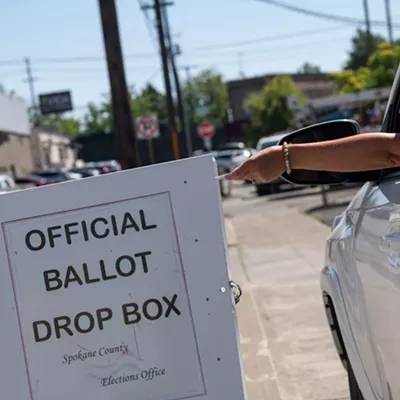"Ten years ago in Spokane, this was a radical concept," says service specialist David Whitney, who's been with the store since the beginning. In those early days, he says, many people entering the store for the first time weren't sure how to react to the soothing d & eacute;cor and soft lighting. "Most of the time when [people] walked in the door, you just heard one word, and that was 'Wow!' -- because there wasn't anything like us in this area."
Huckleberry's is part of Rosauers Supermarkets, Inc. (now a wholly owned subsidiary of URM). When the company opened the store in 1996, the result was a supermarket that didn't look like conventional supermarkets of the time -- and one with a different philosophy and set of priorities.
"It was new and it was fresh and it was something that other people weren't doing here," says store manager Monica Hampton, who began as service specialist when the store opened. She says she jumped at the opportunity to come on board from Rosauers. "I lived just a few blocks away, and I had been a vegetarian through college, so I thought it fit more with how I live."
Somehow, shopping at Huckleberry's doesn't feel like a chore -- the atmosphere feels more comforting than jarring -- and that's all part of the intentional design to distinguish Huckleberry's from your average big-box supermarket.
"It's laid out differently, there's different music," says Hampton. "It's just more laid back."
Indeed, a look around reveals a wide variety of light fixtures, making for a softer lighting scheme overall. Much of the flooring is wood, not linoleum, and the store avoids the row upon row of look-alike aisles so common in other supermarkets. Walls and ceilings and signs run toward warm earth tones or dark hues that are easy on the eyes.
"When we first started, grocery stores were sterile, stark environments," recalls Whitney, who has worked in the grocery business since high school. "To come here to work every day, after being used to that sterile environment, it's very nice. It's calming -- the smells, the lighting -- it's all very relaxing."
"The other thing I love about this store is the neighborhood feel," Hampton adds. "People come in, they meet friends and neighbors, and visit at the bistro. From the very beginning, the plan was to have classes, wine tastings, the in-store massage, the music on Saturday nights -- just something different to make it fun, so people could come in and enjoy being here."
& lt;span class= "dropcap " & O & lt;/span & ver the ten years that Huckleberry's has been open, the grocery business has changed. Local and organic products have gained acceptance in the broader marketplace, with more and more grocery stores adopting or expanding offerings of organics and natural food items. Two local Rosauers markets (plus one in Moscow) now have an in-store Huckleberry's component; Safeway has integrated organics into its product mix and has remodeled several stores' interiors with wood and earth tones and subdued lighting. Even Wal-Mart, the 800-pound gorilla of American grocery shopping, announced this year that it would be adding organics to its low-price lineup.
"I think that benefits all of us in the natural foods business, because it brings in competition for the products, and it brings [wholesale] prices down," says Whitney. "Wal-Mart scares everybody. But they're missing one very key element that I think a lot of other retailers -- including us -- have picked up on, and that's service. It's how you treat your customers. So [other stores] can pick up the products you've got, but if you're still providing a higher level of service, then you don't have to worry."
Hampton says the store's commitment to social responsibility and environmental sustainability makes management just a little bit different at Huckleberry's than at other grocery stores.
"We still have to make the bottom line -- we look at the customer count, at what the store's bringing in," she says. "It's still a business, but we come at it a different way. We're more service-oriented, more knowledge-oriented. It all goes back to listening to what the customers want, and accommodating our customers."
& lt;span class= "dropcap " & T & lt;/span & en years is a long time to stay with any company, yet Huckleberry's has six current employees who helped open the store a decade ago. Whitney says it's the people who've kept him going.
"I could work anywhere, in any grocery store... but I haven't wanted to," he says. "We have such a great crew here. I don't think I'll ever find the same atmosphere that's here."
Hampton agrees that the camaraderie is part of what makes the store special. "I really enjoy all the people, both the customers and the employees," she says. "We have a great working relationship. They all understand and appreciate what we do here and what it stands for."
The other element for her is that she agrees with the store's mission and philosophy. "I shop here," she points out. "I'm glad we're doing what we can to help the environment, to help farmers -- to help as many things as we can."















